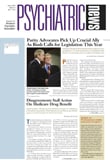For patients with depression, some days it seems as though absolutely nothing is going their way. Then along comes a new clinical trial for the latest antidepressant medication, and they begin to hope that they can become subjects. Psychiatrists can feel free to disabuse them of that notion: A new study of inclusion and exclusion criteria has determined that the vast majority of patients with depression would never be enrolled in a clinical trial. They simply don’t “fit” the rules.
“Studies establishing the effectiveness of antidepressants are based on highly selective samples of depressed patients,” according to researchers from Brown University. In a report appearing in the March American Journal of Psychiatry, the group said that as many as 85 percent of depressed patients treated in an outpatient setting would be excluded from the typical study approved by the federal Food and Drug Administration to determine whether a new antidepressant medication works.
The report was supported by grants from the National Institute of Mental Health.
“When you take any medicine, you assume it’s been found to be effective for your condition,” said Mark Zimmerman, M.D., an associate professor of psychiatry and human behavior at Brown University and director of outpatient psychiatry at Rhode Island Hospital, in a press release. “But no one knows for sure whether antidepressants are effective for most of the patients that we treat.”
Zimmerman and his colleagues reviewed inclusion and exclusion criteria in 31 antidepressant clinical trials published from 1994 to 1998 in five leading psychiatric journals. The majority excluded patients who had psychotic features, a history of manic episodes, any risk of suicide, unstable medical illness, or a history of drug or alcohol use. Several of the studies reviewed also excluded subjects with such comorbid diagnoses as eating disorders, obsessive-compulsive disorder, or any form of panic or anxiety disorder.
Almost all of the studies excluded patients who did not meet a cutoff score on a measure of symptom severity—most commonly the Hamilton Depression Scale—even though they may have met DSM diagnostic criteria for major depressive disorder.
The researchers then conducted diagnostic evaluations of 346 patients at Rhode Island Hospital’s outpatient practice. When they excluded patients with any feature commonly used in the clinical trials, two-thirds of the patients would have been excluded from taking part in an antidepressant trial. If patients with a comorbid anxiety or panic disorder were also excluded, 85 percent would not have qualified for a drug trial.
Yet more than 90 percent of those patients for whom prescribing information was available were being treated with an antidepressant medication at the time of the review.
Zimmerman said that drug companies define patient criteria narrowly in antidepressant trials to minimize any confounding effects on results of the efficacy of the drug being studied, including attempting to minimize the placebo effect.
“But the current practice of limiting studies to only ‘pure’ moderate to severely ill depressive patients may actually skew the findings of the drug trials as well,” Zimmerman said. If antidepressants are not effective for some of the large subgroups of depressed individuals who have comorbid disorders, prescribing an antidepressant would incur an unjustifiable exposure of risks and side effects, he added.
“Drug companies have been very correct in assuming that if they show their medicine works for a highly select group of depressed patients, physicians will use it for all patients,” Zimmerman concluded.
American Journal of Psychiatry 159 469
